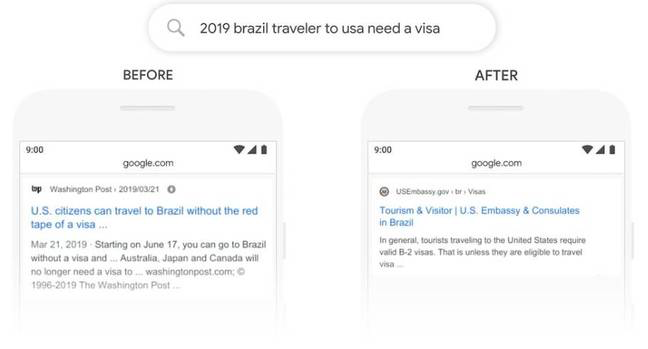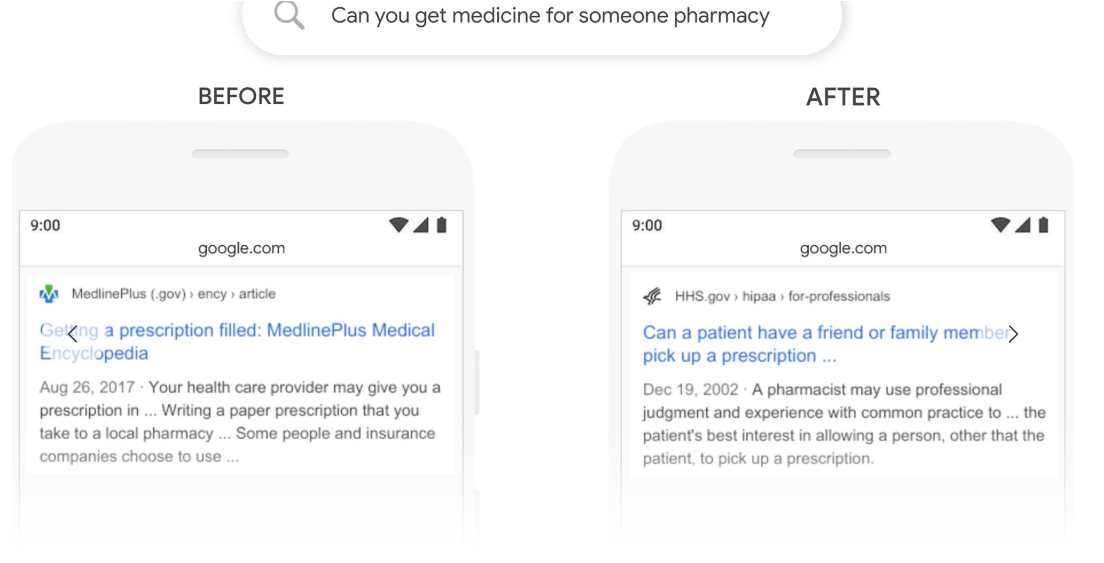Google BERT Search Technology: What You Need To Know
Google is changing the way it displays search results to users.
Google reported last week that it is switching to a new machine-powered language processing technology to improve the way the search engine understands context behind searches in its browser.
The new BERT technology is designed to look at the sequence of words in queries, instead of just picking out the most important words, as Google's previous search technology performed.
By using new neural networking techniques better designed to understand the intent behind queries, Google says it will be able to offer more relevant results for about 1 out of 10 searches.
While few users will notice a difference, according to Google, this will fundamentally change the way websites appear in search results.
Google offered a few examples of just how queries would affect certain search results, and we will delve into them here.
Why is BERT important?
Ultimately, BERT could affect page rankings, SEO and PPC. Website owners may suddenly find themselves not ranking on search terms they used to see themselves rank for.
BERT focuses on long-tail searches. In recent years, searching on Google has become more conversational. More prepositions are used, and these prepositions could fundamentally alter the meaning of a query, if misinterpreted.
Before, Google would pull out important words out of query and show search results based on those queries. For example, for the query "parking on hill with no curb", Google's old search technology would focus on the words 'parking', 'hill', and 'curb' while paying less attention to the prepositions.
As a result, users would often see results that would show how to park on ANY hill with a curb, while ignoring the most important word in the query, 'no'.
The BERT Google search technology is supposed to remedy this issue, by focusing not just on words, but the sequence they appear.
"BERT models can consider the full context of a word by looking at the words that come before and after it, particularly useful for understanding the intent behind search queries," Google Vice President Pandu Nayak said at the press conference.
BERT Search Examples
Google gave a few screenshots comparing search results from old queries using Google's old technology with the new BERT technology.
For the search query: "2019 brazil traveler to use need a visa" you get this:

The left results assumes the searcher is a US traveler heading to Brazil, whereas on the right the new Google Search result using BERT identifies the searcher as a Brazilian travels going to the US. The previous technology misunderstood the use of the word 'to'.
For the previous search query "parking on a hill with no curb" you would get this:
Previously, Google would have figured the word 'curb' to be important in such a search while ignoring the word 'no' which would give you results about parking on a hill that actually had a curb. BERT is designed to no longer do that.
For the search query "can you get medicine for someone pharmacy' you would get this:

BERT Search Benefits
When asked whether websites should expect an increase or decrease in traffic, Nayak declined to give specifics. He did however say that one major benefit of the switch to BERT technology would be an increase in overall searches, because the results Google offers will be more relevant.
Also, BERT will be better designed to pick up voice searches, which often come in the form of sentences and questions and are more conversational in nature.
BERT Search Drawbacks
BERT is not perfect and some of the areas where it needs improvement were mentioned in the press conference.
Firstly, BERT sometimes misreads intent. If for example you search for "what state is south of Nebraska" you may get suggested a Wikipedia page for South Nebraska, which is actually just a district in Florida. The correct answer would be Kansas.
Secondly, only results in English are available as of now and in the United States, meaning other countries will have to wait to see the technology applied to their languages.
How to optimize for BERT
A lot of people are already asking how to optimize for BERT.
SearchEngineLand noted in a post that "many SEOs and many of the tracking tools did not notice massive changes in the Google search results while this algorithm rolled out in Search over the last week."
When looking at why this was this case for such a major change, they came up with several reasons.
One reason is that the tracking tools that exist out there such as Mozcast are primarily for tracking shorter queries, and therefore BERT's impact will be negligible.
Secondly, site owners typically do not focus on long-tail queries when they look at rankings. Instead, site owners focus on searches with higher volumes that bring the most traffic to websites, and these tend to be shorter searches.
Given this lack of a response, Google has said that there is no real way to optimize content for BERT, since it's function is to better understand searches for Google.
That being said, SearchEngineLand suggests that "the upside for SEOs and content creators is they can be less concerned about writing for the machines. Focus on writing great content for real people."
BERT Takeaways
Just like with every change Google makes to its search algorithms, there are worries among the SEO and PPC community about how this can affect their rankings.
It is one of the tradeoffs of building businesses that rely on these platforms. As soon as they make a change, your business is at the mercy of these giants.
However, just like with recent changes Google made to its match types in Google Ads, the switch to BERT also shows that Google is focusing more on the intent of search queries rather than the actual words users use.
This could mean that SEO hacks for how to get content ranked will become less and less important.
Instead the focus should be on providing great content and optimizing for user experience, while letting the algorithms do their own thing.
Try Aori
Spending too much time on your Google Ads? Try our Google Ads Editor alternative for a smoother, faster and more effective experience.
